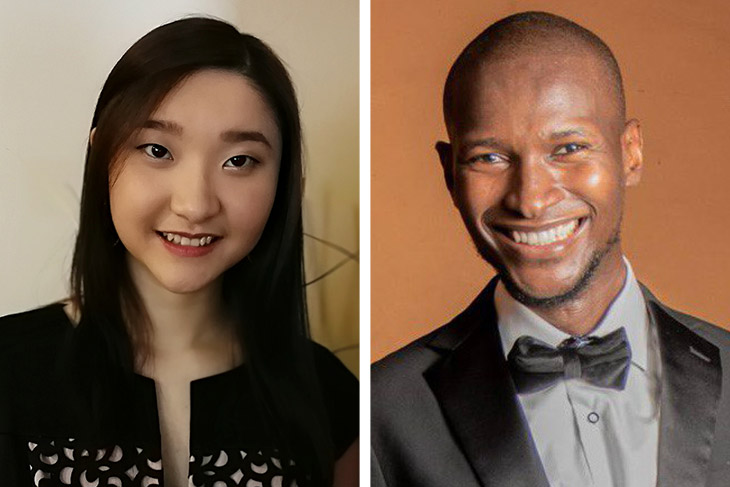Two RIT students earn Google Ph.D. Fellowships for AI computing research
Student researchers use artificial intelligence to improve usability and accessibility
RIT students Emily Kuang and Allahsera Auguste Tapo have earned Google Ph.D. Fellowships for their research in artificial intelligence.
Two Rochester Institute of Technology students have won Google Ph.D. Fellowships for their work as some of the most promising young academics in the world.
Emily Kuang and Allahsera Auguste Tapo—both students in the computing and information sciences Ph.D. program—will receive full tuition, a stipend, and Google research mentorship as part of their fellowships for up to three years. The researchers are working to make information more usable and accessible to everyone, with Kuang researching human-computer interaction and Tapo focusing on natural language processing
The Google Ph.D. Fellowship recognizes graduate students doing exceptional and innovative research in areas relevant to computer science and related fields. The fellowships support promising Ph.D. candidates from all backgrounds who seek to influence the future of technology. In 2023, there were 67 Google Ph.D. Fellows worldwide.
Emily Kuang creates AI assistant for UX
Kuang won a fellowship for her project titled “Crafting human-AI collaborative analysis for user experience evaluation.” Through her research, she designs, evaluates, and improves human-AI collaborative tools to support usability and user experience (UX) analysis.
She aims to create an AI-powered conversational assistant that can support UX evaluators—the people who identify usability problems with apps, websites, and hardware interfaces. Kuang has always had a desire to help people and completed two internships as a UX evaluator at Meta.
In practice, UX evaluators will conduct individual analysis, then come together for group discussions and work to make products more user-friendly. However, UX evaluators in industry are often pressed for time.
“We could be using AI to efficiently double check and validate those results,” said Kuang, who is from Shenzhen, China, and Toronto, Canada. “AI can act as that second opinion.”
As part of the Google fellowship, the students will take part in virtual summits and mentorship opportunities. Kuang said she is excited to connect with people doing amazing work outside her field.
“Throughout my graduate studies, I have met incredibly talented students and have always struggled with imposter syndrome,” Kuang said. “Part of the learning process has been developing the strength to handle paper rejection. The journey has been challenging, but the satisfaction of receiving a fellowship like this and having that sense of validation has been really rewarding.”
Kuang is in the fourth year of her RIT Ph.D. program. She earned a bachelor’s in biomedical engineering from the University of Waterloo, Canada.
Allahsera Auguste Tapo uses AI to translate the languages of Mali
Tapo won the fellowship for his research titled, “Natural language processing crowdsourcing for predominantly oral languages.” He aims to develop an AI-powered speech-to-speech translation tool that helps people communicate in their own languages.
Tapo explained that his home country of Mali, Africa, has 13 official national languages. For example, French (a former official language, now a working language) is used in government, but is only used by about 35 percent of the population. Meanwhile, the Bambara language—which has a predominantly oral tradition—is spoken by more than 80 percent of the population.
“I want to help people have more access to information—and language is the biggest barrier,” said Tapo. “More and more, languages are going extinct and that could wash away these cultures. It’s important to the development of these countries that people are able to identify with their own cultures.”
Creating AI-powered speech-to-speech translation requires a lot of text and speech data. The language of Bambara does not currently have a large digital presence. Tapo is already working with a partner in Mali who is creating AI-generated children’s stories in Bambara, through a Bill & Melinda Gates Foundation grant.
“With this Google fellowship, I can really focus on what I want to accomplish—and you can’t put a price tag on that,” said Tapo. “I’m excited to help open my people to the world, and open the world to my people.”
In the future, Tapo would like to collaborate with governments in Sub-Saharan Africa in using computing to help people help themselves. He said that he would like to someday expand his AI tool to help translate the approximately 2,000 languages in Africa, and beyond.
Tapo first came to RIT as part of the Fulbright Foreign Student Program. He completed his computer science master’s degree at RIT in 2020. Tapo is in the third year of his Ph.D. program. He earned two bachelor’s degrees—one in computer science and the other in system and networking administration—from the Institut Universitaire de Formation Professionnelle de Segou, in Mali.
The computing and information sciences Ph.D. program is in RIT’s Golisano College of Computing and Information Sciences. It is one of 12 Ph.D. degrees offered at RIT.







